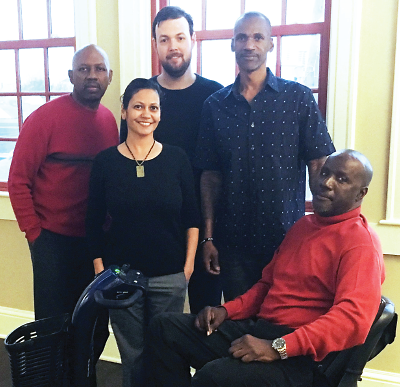APA Foundation Gives ‘Helping Hand‘ to Former Inmates
Abstract
Medical students who have won a “Helping Hands” grant from the APA Foundation are facilitating group therapy for former inmates in Louisiana.
Interpersonal trauma is a topic that is often discussed in group therapy at the Formerly Incarcerated Transitions (FIT) clinic in New Orleans.

From left: Norris Henderson, director of Voice of the Experienced (VOTE); Anjali Niyogi, M.D., director of the FIT Clinic; Zach Lenane, a fourth-year medical student at Tulane University; Thad Tatum, lead group facilitator; and Louis Ward, group facilitator.
The support group, which meets twice a month, is funded through a “Helping Hands” grant from the APA Foundation. The grant was awarded to Tulane University School of Medicine based on a proposal from medical students studying psychology.
“The goal [of the support group] is to help people with the emotional impact of re-entry,” project leader and Tulane medical student Zach Lenane told Psychiatric News. “It’s also about community building: reducing isolation in an unfairly stigmatized population by developing a group of supportive peers.”
Formerly incarcerated people tend to be sicker and have significantly higher rates of mental illness than the general population, Lenane and fellow Tulane grant recipients Kristen Whalen and Charlotte McLean wrote in their APA grant application. “They are more likely to have experienced trauma as children and adults. Incarceration itself is a traumatic stress capable of causing posttraumatic stress reactions.”
The FIT clinic was started in 2015 by Tulane professor Anjali Niyogi, M.D., M.P.H., and medical student William Vail to provide medical and case management services to former inmates to help them enroll in health insurance and access medical care and subspecialty referrals. Additionally, the FIT clinic works alongside community organizations to link patients with housing, job training, and employment when possible. The grant from the APA Foundation enabled the support group to run for a second year.
Student case managers provide information to new FIT clinic patients, follow up with those who express interest in joining the support group, and arrange transportation to and from sessions.
The support group provides a safe space for members to “talk about the emotional and practical difficulties of re-entry and get connected to available resources,” Lenane said. “By partnering with community mental health organizations, we are also able to get people in for individual counseling and psychiatric care.”
In addition to mental health specialists, the group includes peer “discussion leaders” who are familiar with re-entry and have navigated the process successfully. “Ownership of the group by formerly incarcerated individuals adds credibility to the program and has been central to its success,” Lenane said.
Thad Tatum is the main group facilitator. While serving 28 years in Louisiana’s Angola Prison, he led substance abuse support groups and earned a B.S. degree. Since his release six years ago, he has become a certified addiction counselor and participant in Voices of the Experienced (VOTE), an advocacy organization for formerly incarcerated individuals. Lenane met Tatum through VOTE and what he called “a thick patchwork of community organizations.”
“Developing this program with Thad has opened my eyes to the power of group therapy and how simply being part of a community can be healing.”
Participating in the project has reinforced Lenane’s longstanding interest in psychiatry. A fourth-year medical student, he is now applying to psychiatry residency programs.
“Some might think working with people who have been traumatized by incarceration must be demoralizing. Attempting to navigate systemic barriers to needed care can certainly be frustrating, but this community’s resilience in the face of historic injustice and strong advocacy for those affected by it is incredibly moving and a source of personal inspiration.” ■
Information about the Helping Hands grant program can be accessed here.



